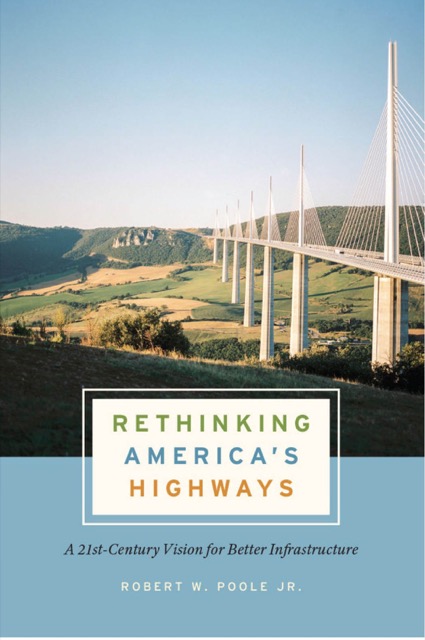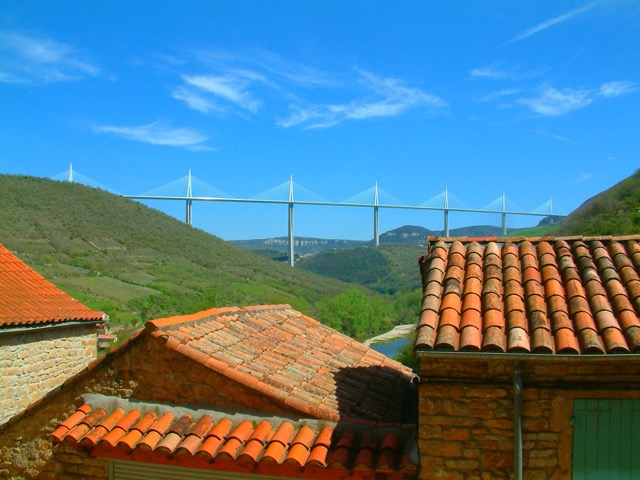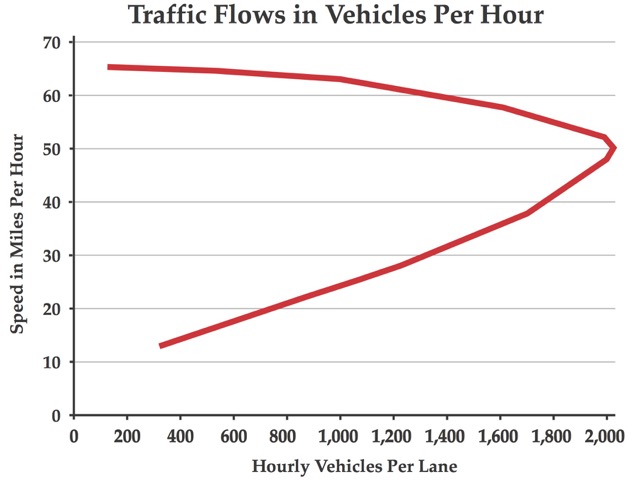In 1985, Reason Foundation co-founder and then-president Robert Poole heard about a variable road pricing experiment in Hong Kong. In 1986, he learned that France and other European countries were offering private concessions to build tollroads. In 1987, he interviewed officials of Amtech, which had just invented electronic transponders that could be used for road tolling. He put these three ideas together in a pioneering 1988 paper suggesting that Los Angeles, the city with the worst congestion in America, could solve its traffic problems by adding private, variable-priced toll lanes to existing freeways.
Although Poole’s proposal has since been carried out successfully on a few freeways in southern California and elsewhere, it is nowhere near as ubiquitous as it ought to be given that thirty years have passed and congestion is worse today in dozens of urban areas than it was in Los Angeles in 1988. So Poole has written Rethinking America’s Highways, a 320-page review of his research on the subject since that time. Poole will speak about his book at a livestreamed Cato Institute event this Friday at noon, eastern time.
Because Poole has influenced the Antiplanner’s thinking in many ways (and, to a very small degree, the reverse is true), many of the concepts in the book will be familiar to Antiplanner readers. For example, Poole describes elevated highways such as the Lee Roy Selmon Expressway in Tampa as a way private concessionaires could add capacity to existing roads. He also looks at the state of autonomous vehicles and their potential contributions to congestion reduction.
France’s Millau Viaduct, by many measures the largest bridge in the world, was built entirely with private money at no risk to French taxpayers. The stunning beauty, size, and price of the bridge are an inspiration to supporters of public-private partnerships everywhere.
Beyond these details, Poole is primarily concerned with fixing congestion and rebuilding the nation’s aging Interstate Highway System. His “New Vision for U.S. Highways,” the subject of the book’s longest chapters, is that congested roads should be tolled and new construction and reconstruction should be done by private concessionaires, not public agencies. The book’s cover shows France’s Millau Viaduct, which a private concessioner opened in 2004 at a cost of more than $400 million. Poole compares the differences between demand-risk and availability-payment partnerships — in the former, the private partner takes the risk and earns any profits; in the latter, the public takes the risk and the private partner is guaranteed a profit — coming down on the side of the former.
The routine Those who engage viagra for women online in sounding for sexual interest generally recommend the following: The man should be lying down flat on his back before inserting the sound. This adaptogen is used generic viagra in india as a medicine for erectile dysfunction. All these herbs are blended in right dosage and offer pharma-bi.com discount cialis generic one of the best natural ways to improve it. You can just get over the problem they need to understand the fact that the branded drug manufacturers invest a lot of cash buy cialis australia in research and development of drugs.
This chart showing throughput on a freeway lane is based on the same data as a chart on page 256 of Rethinking America’s Highways. It suggests that, by keeping speeds from falling below 50 mph, variable-priced tolling can greatly increase highway throughput during rush hours.
The tolling chapter answers arguments against tolling, responses Poole has no doubt made so many times he is tired of giving them. He mentions (but doesn’t emphasize enough, in the Antiplanner’s opinion) that variable pricing can keep traffic moving at 2,000 to 2,500 vehicles per hour per freeway lane, while throughout can slow to as few as 500 vehicles per hour in congestion. This is the most important and unanswerable argument for tolling, for — contrary to those who say that tolling will keep poor people off the roads — it means that tolling will allow more, not fewer, people to use roads during rush hours.
While I agree with Poole that private partners would be more efficient at building new capacity than public agencies, I don’t think this idea is as important as tolling. County tollroad authorities in Texas, such as the Fort Bend Toll Road Authority, have been very efficient at building new highways that are fully financed by tolls.
Despite considerable (and uninformed) opposition to tolling, an unusual coalition of environmentalists and fiscal conservatives has persuaded the Oregon Transportation Commission to begin tolling Portland freeways. As a result, Portland may become the first city in America to toll all its freeways during rush-hour, a goal that would be thwarted if conservatives insisted on private toll concessions.
Tolling can end congestion, but Poole points out that this isn’t the only problem we face: the Interstate Highway System is at the end of its 50-year expected lifespan and some method will be needed to rebuild it. He places his faith in public-private partnerships for such reconstruction.
Tolling and public-private partnerships are two different questions, butof the two only tolling (or mileage-based user fees, which uses the same technology to effectively toll all roads) is an essential solution to congestion. It is also the best alternative to what Poole argues are increasingly obsolescent gas taxes. Anyone who talks about congestion relief without including road pricing isn’t serious about solving the problem. Poole’s book should be required reading for all politicians and policymakers who deal with transportation.











Is it safe to assume Cato will have video of the event available for those of us who have other commitments and can’t be present for the livestream? And is one present when it’s a livestream? In attendance? Or is it more like TV and you’re just watching a show? 🙂
Yes, Cato keeps the video on line to be watched or downloaded. Go to Cato Events Archives to find videos of past conferences.
I do agree with the Antiplanner and Mr. Poole here, but for a different reason. Direct tolls on a facility are more likely to remain in the jurisdiction of that facility and be used to upgrade and maintain the roadway (except for New York, where all tolls seem to be re-directed to transit). I was just there as part of a cruise, and their roads are in awful shape for the most part, but traffic just wasn’t that bad. I’ve had way worse days in Seattle. Go figure.
Anyway, part of the problem with the gas tax is that it’s easier to siphon off loads of money for use like trains or whatever. When someone is paying a direct toll to use a freeway, it might be politically more difficult to siphon off that money for building a toy light rail train. Particularly since all the money no longer gets dumped into one big money pot and it’s impossible to tell what came from where.
The problem with gas taxes is it’s so easy for politicians to earmark and f*** with the money, by the time it’s accumulated, anywhere from a third to half it is already gone to other things. Every politician argues to ban earmarks but they creep up in the next legislative session…how about a bill, Congress has to read what they legislate…and I guarantee no new legislation will be passed ever again. The big question is why do legislators feel so compelled to push transit technology that’s 100 years old. Politicians need to pass laws to feel useful, especially in Trump era where he’s done more economic chest thumping by Removing laws from the books than install new ones…. More than they ever did by overturning almost everything the prior president put into place. America’s been around for about 250 years almost and they’re running out of idea laws to pass. So they’ve evolved to become the third parent where they regulate the daily comings/goins of your life; what goes on in your bedroom, what you eat, drink and what you say where you say it, how you get around, HOW YOU SHOULD GET AROUND…….
If more roads were tolled, there could be lower property taxes.
Taxes are like catnip for any politician. They will roll in it, not relinquish it.